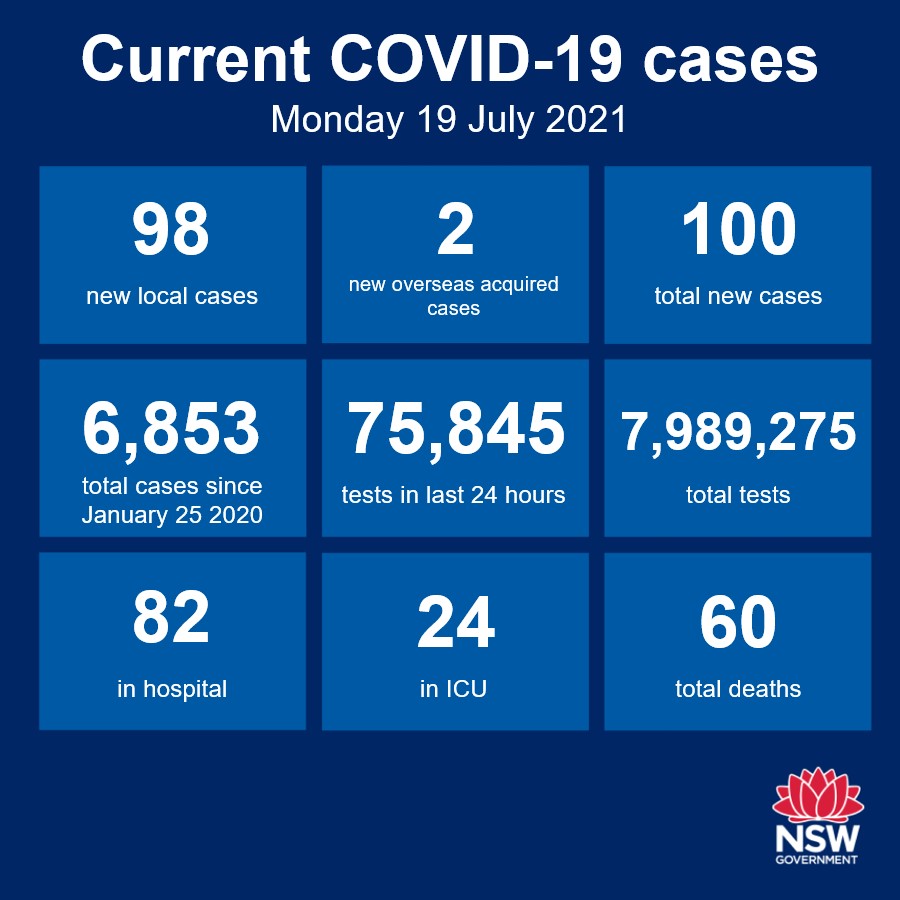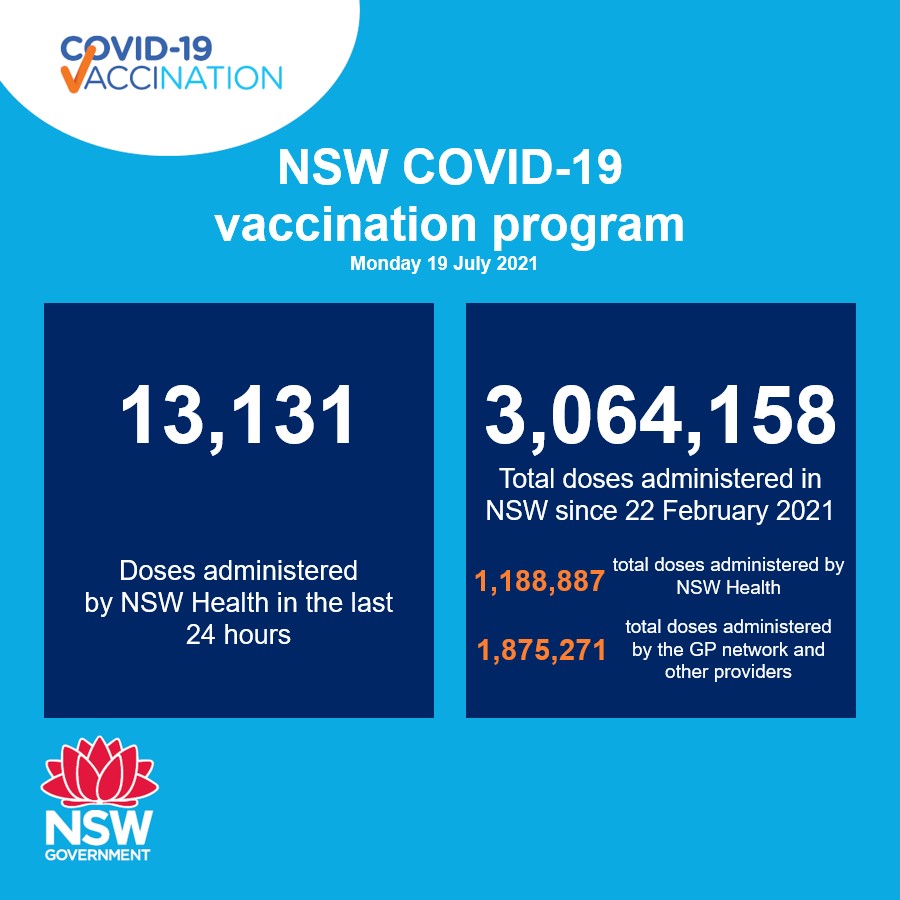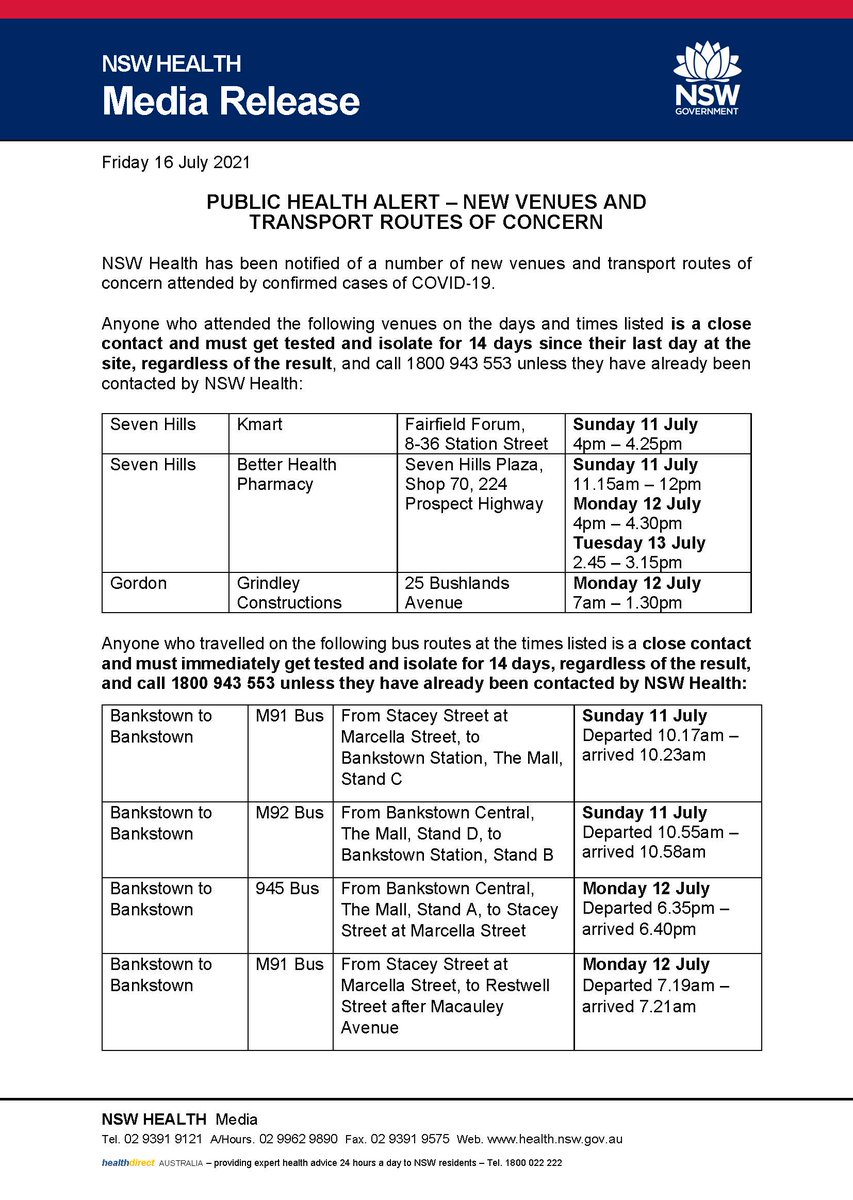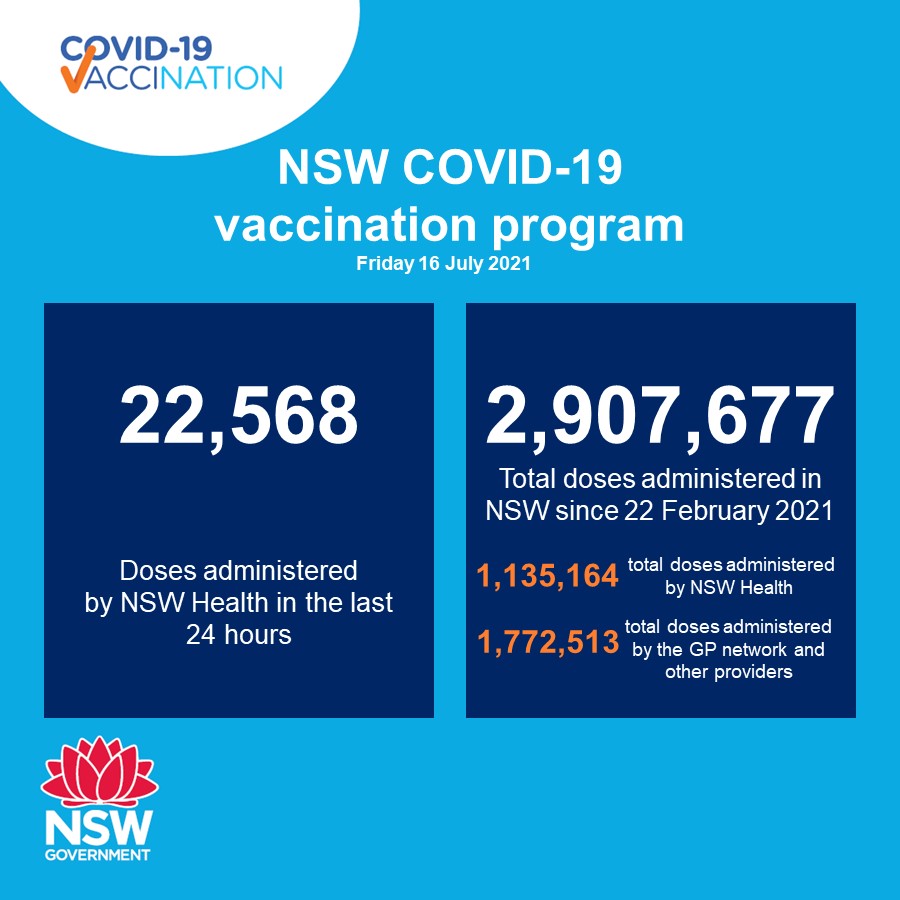
NSW recorded 105 new locally acquired cases of #COVID19 in the 24 hours to 8pm last night. 



Of these locally acquired cases, 66 are linked to a known case or cluster – 55 are household contacts and 11 are close contacts – and the source of infection for 39 cases remains under investigation.
69 cases were in isolation throughout their infectious period and seven cases were in isolation for part of their infectious period. 27 cases were infectious in the community, and the isolation status of two cases remains under investigation.
Four new overseas-acquired cases were recorded in the same period. The total number of cases in NSW since the beginning of the pandemic is now 6,753.
Sadly, a woman in her 90s from south-eastern Sydney died yesterday. NSW Health extends its sincere sympathies to her family.
There have been 1,242 locally acquired cases reported since 16 June 2021, when the first case in the Bondi cluster was reported.
There are currently 76 COVID-19 cases admitted to hospital, with 18 people in intensive care, seven of whom require ventilation.
There were 66,671 COVID-19 tests reported to 8pm last night, compared with the previous day’s record daily high of 81,970.
NSW Health administered 16,877 COVID-19 vaccines in the 24 hours to 8pm last night, including 7,390 at the vaccination centre at Sydney Olympic Park.
The total number of vaccines administered in NSW is now 3,031,331, with 1,175,756 doses administered by NSW Health to 8pm last night and 1,855,575 administered by the GP network and other providers, to 11.59pm on Friday 16 July.
Of the 105 locally acquired cases reported to 8pm last night, 76 are from South Western Sydney Local Health District (LHD), 12 are from Western Sydney LHD, nine are from South Eastern Sydney LHD, five are from Sydney LHD, two are from Nepean Blue Mountains LHD -
- and one is from Northern Sydney LHD.
Given the high number of COVID-19 cases in the community, restrictions have been tightened across Greater Sydney to limit transmission of the virus’s highly infectious Delta strain.
Under a Public Health Order in force from 11.59pm tonight until 11.59pm on Friday 30 July, every employer across NSW must require a worker to work from home unless it is not reasonably practicable.
In Greater Sydney (and those outside of Greater Sydney who are subject to the stay- at-home rules if they have been in Greater Sydney in the previous 14 days), it is a reasonable excuse to leave your residence for work – but only when it is not practicable to work from home.
Residents of Fairfield, Canterbury Bankstown and Liverpool Local Government Areas (LGAs) are not permitted leave their LGA for work unless they are an authorised worker.
A list of workers who are authorised to leave their LGA for work is available here: nsw.gov.au/covid-19/rules…. Even if you are an authorised worker you must only leave your home for work if it is not practicable to work from home.
Where Fairfield LGA residents need to leave their LGA for work, they are required to be tested for COVID-19 every three days, even if they do not have symptoms.
Under the new public health order, retail premises are required to close across Greater Sydney including the Central Coast, Blue Mountains, Wollongong and Shellharbour. The retail premises which can remain open are:
•supermarkets and grocery shops,
•shops that predominantly sell food or drinks; including butchers, bakeries, fruit shops and delicatessens, but does not include restaurants or cafes.
•chemists and pharmacies,
•kiosks,
•shops that predominantly sell food or drinks; including butchers, bakeries, fruit shops and delicatessens, but does not include restaurants or cafes.
•chemists and pharmacies,
•kiosks,
•shops that predominately sell office supplies, pet supplies, newspapers, magazines and stationery, alcohol, maternity and baby supplies, medical or pharmaceutical supplies,
•food and drink premises, but only to sell takeaway
•cellar door premises, but only to sell takeaway
•food and drink premises, but only to sell takeaway
•cellar door premises, but only to sell takeaway
•hardware and building supplies,
•landscaping material supplies,
•rural supplies,
•timber yards,
•garden centres and plant nurseries,
•landscaping material supplies,
•rural supplies,
•timber yards,
•garden centres and plant nurseries,
•vehicle hire premises, not including the premises at which vehicles are sold,
•shops that predominately carry out mobile phone repairs.
•shops that predominately carry out mobile phone repairs.
Service stations, banks, post offices, laundromats and drycleaners can remain open.
Anyone who leaves their home must carry a mask with them at all times. They must be worn when working outdoors, by all school staff, by all people in outdoor markets, outdoor shopping strips, and in an outdoor queue waiting for products such as coffee and food.
Across Greater Sydney, all carpooling must be stopped unless among members of the same household or other limited exemptions, such as an emergency.
Persons over the age of 18 must carry evidence of their address when in a vehicle with another person and provide it to police upon request.
From 12.01am Monday 19 July, all construction must be paused unless it is necessary to deal with environmental risks, secure a site or maintain critical equipment; to maintain public utilities; to maintain the safe operation of transport infrastructure; -
- if it is a construction site necessary for NSW Health in response to the COVID-19 pandemic; or if it is an emergency.
All non-urgent maintenance work including cleaning services and repair work on residential premises must be paused unless it is urgently required to ensure the health, safety or security of the place of residence or the people who reside there.
We are asking people not to seek exceptions to the rules, but instead to ensure they comply with them, in order to reduce the number of infectious cases of COVID-19 in the community.
At this time, it is most important to focus on anyone who has COVID-19 symptoms or is a close or casual contact of confirmed cases. These people must immediately get tested as soon as possible.
We ask you to please stay in the line when testing clinics are busy and identify yourself to staff and tell them that you have symptoms.
In samples collected on 15 July, NSW Health’s ongoing sewage surveillance program detected fragments of the virus that causes COVID-19 in a number of catchments in Greater Sydney, including Wollongong, Rouse Hill, and Port Kembla.
No recent cases have been identified in Wollongong.
People who live or work in Wollongong, as well as the other areas asked to be especially vigilant for the onset of any cold-like symptoms, and if they appear, to be tested immediately and isolate until a negative result is received.
If you are directed to get tested for COVID 19 or self-isolate at any time, you must follow the rules whether or not the venue or exposure setting is listed on the NSW Health website.
It remains vital that anyone who has any symptoms or is a close or casual contact of a person with COVID-19, isolates and is tested immediately.
When testing clinics are busy, please ensure you stay in line, identify yourself to staff and tell them that you have symptoms or are a contact of a case.
Please check the NSW Government website regularly, and follow the relevant health advice if you have attended a venue of concern or travelled on a public transport route at the same time as a confirmed case of COVID-19: nsw.gov.au/covid-19/lates…
There are more than 400 COVID-19 testing locations across NSW, many of which are open seven days a week. To find your nearest clinic visit: nsw.gov.au/covid-19/how-t… or contact your GP.
• • •
Missing some Tweet in this thread? You can try to
force a refresh
















